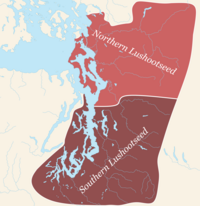sdukʷalbixʷ | |
|---|---|
 Snoqualmie Tribal Government Campus, Snoqualmie, Washington | |
| Total population | |
| approximately 650 | |
| Regions with significant populations | |
| City of Snoqualmie City of North Bend Greater Seattle Area | |
| Languages | |
| English, Southern Lushootseed | |
| Religion | |
| Christianity, traditional tribal religion | |
| Related ethnic groups | |
| other Snoqualmie people |
The Snoqualmie Indian Tribe (Lushootseed: sdukʷalbixʷ)[1] is a federally recognized tribe of Snoqualmie people. They are Coast Salish Native American peoples from the Snoqualmie Valley in east King and Snohomish Counties in Washington state. Other names for the Snoqualmies include Snoqualmu, Snoqualmoo, Snoqualmick, Snoqualamuke, and Snuqualmi.[2]
YouTube Encyclopedic
-
1/4Views:90013 784516 065268 483
-
Everlasting Valley-Snoqualmie History Documentary
-
Snoqualmie Falls: A Legacy of Shared History
-
Native Americans for Kids: Cherokee, Apache, Navajo, Iroquois and Sioux | Kids Academy
-
Snoqualmie Pass in the Cascade Range
Transcription
History
Some Snoqualmies settled onto the Tulalip Reservation after signing the Point Elliott Treaty with the Washington Territory in 1855, but many remained in their ancestral homelands around the Snoqualmie Valley and Lake Sammamish. At that time they were one of the largest tribes in the Puget Sound region numbering around 4,000.[3] In 1937 the Federal Government proposed granting a reservation though in the end the land was never given.[4] The tribe lost federal recognition in 1953. In October 1999, the Bureau of Indian Affairs once again granted recognition to the Snoqualmie.[5]
They purchased land for and were granted a reservation near Snoqualmie, Washington, on which the tribe opened the Snoqualmie Casino in 2008.[6] They have tried and failed on several occasions to secure a reservation on their ancestral lands along the Tolt River (a tributary of the Snoqualmie River) until the Snoqualmie Tribe Ancestral Forest was purchased by the tribe at the end of 2021. The 12,000-acre ancestral forestlands (4,900 ha) in East King County holds environmental, economic, and historic value to the tribe.[7] The land, most recently used for industrial timber, will be sustainably harvested while the ecosystem is managed to support the native plant and wildlife populations.[8]
Government
The Snoqualmie Tribe is governed by a Tribal constitution and an elected Council. The Tribe's governing structure includes building codes, health codes and other standard governmental functions.
References
- ^ Bates, Dawn; Hess, Thom; Hilbert, Vi (1994). Lushootseed Dictionary. Seattle: University of Washington Press. pp. 84–85. ISBN 978-0-295-97323-4. OCLC 29877333.
- ^ "Snoqualmie Tribe – NPAIHB". Retrieved November 16, 2022.
- ^ Krishnan, Sonia (January 4, 2005). "Snoqualmie Tribe on road to self-sufficiency". The Seattle Times.
- ^ Tribe, Snoqualmie. "Snoqualmie Tribe Releases First Economic Impact Study | Snoqualmie Indian Tribe". Retrieved November 16, 2022.
- ^ "Snoqualmie Tribe History". Governor's Office of Indian Affairs. Archived from the original on February 4, 2010. Retrieved March 7, 2008.
- ^ Miletich, Steve (November 2, 2008). "Snoqualmie Tribe's big bet: The casino that almost wasn't". The Seattle Times. Retrieved March 6, 2019.
- ^ Opong, Diana (February 5, 2022). "For the first time in generations, a tribe in Washington has land". OPB. Retrieved February 6, 2022.
- ^ "Snoqualmie Indian Tribe purchases thousands of acres of ancestral forestlands". KOMO News. February 6, 2022. Retrieved February 7, 2022.
Further reading
- Tweddell, Colin E. The Snoqualmie-Duwamish Dialects of Puget Sound Coast Salish: An Outline of Phonemics and Morphology. University of Washington publications in anthropology, v. 12. Seattle: University of Washington Press, 1950.
External links
- Snoqualmie Tribe, Official Snoqualmie Tribe web site
- Snoqualmie Rights Day, Official information about Snoqualmie Rights Day and tribal sovereignty
- Snoqualmie Tribe Culture Department, Official web site of the Snoqualmie Tribe Culture Department
47°31′09″N 121°50′30″W / 47.51917°N 121.84167°W

